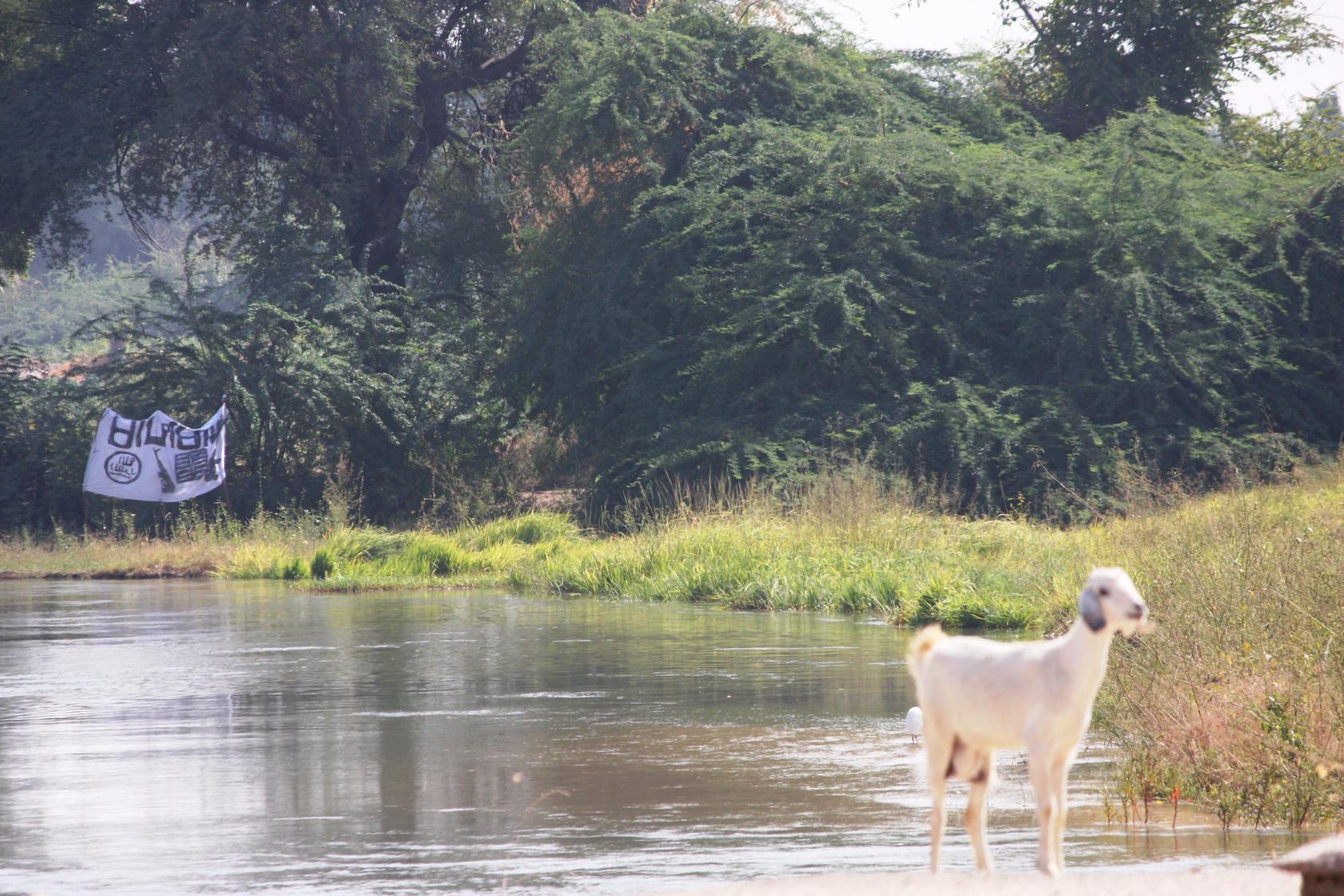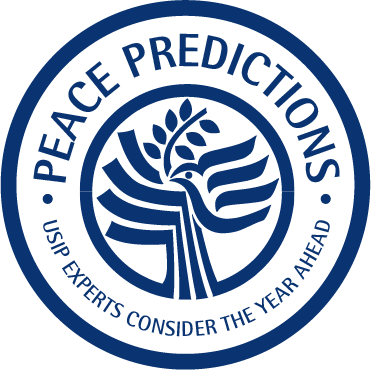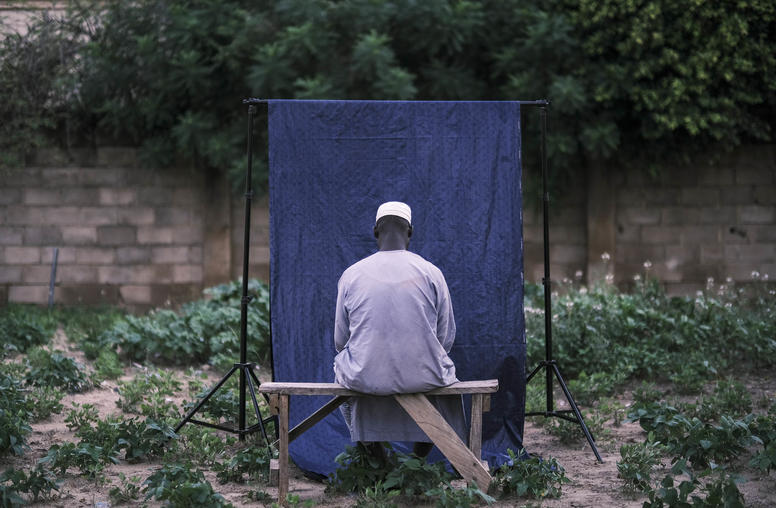Q&A: Amid Boko Haram’s War and Postponed Vote, What Prospects for Nigeria’s Election?
Peace Predictions: USIP Experts Consider the Year Ahead
Nigeria, Africa’s most populous country, begins 2015 at the brink of both a historically important election and a breakdown of state authority that is simultaneously cause and effect of the Islamist Boko Haram rebellion. Nigeria’s ability to govern itself effectively will be critical in determining whether Boko Haram can be contained or continues to grow into a trans-national threat like that of the Islamic State of Iraq and Syria (ISIS) in the Middle East.

 That question lends enormous import to an election in which President Goodluck Jonathan, from Nigeria’s south, is facing a powerful challenge from one of the country’s former military rulers, retired general Muhammad Buhari, a northerner. The election is a re-match of the 2011 vote, which led to deadly riots in the north after Buhari’s defeat.
That question lends enormous import to an election in which President Goodluck Jonathan, from Nigeria’s south, is facing a powerful challenge from one of the country’s former military rulers, retired general Muhammad Buhari, a northerner. The election is a re-match of the 2011 vote, which led to deadly riots in the north after Buhari’s defeat.
Just a week before the February 14 vote, Nigerian authorities dismayed democracy advocates by postponing it for six weeks, saying the country’s military and intelligence chiefs had warned that security could not be assured. U.S. Institute of Peace Vice Chairman George Moose, a former assistant secretary of state for African affairs, discusses the elections, his recent mission to Nigeria at the head of a pre-election observation team, and USIP’s role in the country.
What are the implications of Nigeria’s decision to postpone this election?
The postponement will not solve problems related to the preparation of the elections, and will only add to apprehension by the opposition that the government—facing the closest election in Nigeria’s history—is intent on taking it by hook or by crook. And that fear, whether it’s correct or not, is a likely formula for provocation and violence. And that’s an immediate concern.
The security situation in the northeast of the country does indeed pose a significant challenge to the holding of the vote, and election authorities recently have been working on ways to overcome that. But let’s be clear: This problem has been obvious for the past three years. For the authorities to now suddenly say ‘We have to postpone the elections because we realize we have a problem in the northeast’ rings as disingenuous. Moreover, it’s highly questionable whether anything serious can be done in the next month and a half that would significantly improve the security environment.
So this fear that the government may now try to manipulate the election outcome raises dangers that are going to be a challenge to everyone—election officials, civil society organizations and others—who are trying to mitigate the risks of electoral violence.
How would you describe the stakes for Nigeria in this election?
These are not going to be perfect elections. Anybody who’s expecting that under the current circumstances is not looking at reality. These will, however, be Nigeria’s most important elections since its return to democracy in 1999. And they will be the most closely contested, which increases the potential for violence.
This is all the more reason for the international community to be bringing its contribution—in part simply to demonstrate its engagement, its concern—its witness, if you will—of what’s going on in Nigeria. But also to make practical contributions to building the organizations that are essential to both the conduct of these elections and to a democratic institutional base in Nigeria. Assuming that these elections produce a reasonably good outcome, there’s going to be plenty more work to do in that vineyard.
You’ve recently returned from a pre-election monitoring mission to Nigeria. What did that involve?
The purpose of the mission, jointly sponsored by the National Democratic Institute and the International Republican Institute, and which I was asked to lead, was precisely to go out and try to assess the state of preparedness for those elections. And within reason, to try to identify actions that could be taken to enhance the prospects for a fair and legitimate elections process that would build confidence among all the stakeholders, and thus help to prevent or mitigate election-related violence. Nigeria has a long, unfortunate history of election violence, including in the previous presidential vote, in 2011. And it’s precisely why there has been such attention in the run-up to the 2015 elections to this question of what can be done to assure all of those who are participating that this is going to be a process that’s fair and that will respect the will of the people. I have to say, NDI and IRI, as well as others, have made practical contributions toward that.
What recommendations were at the top of your list?
Let me start with the fact that these elections will be employing technologies and methodologies that have never been used in Nigeria before. They will use a permanent voter registration card that incorporates biometrics, and also automated, electronic card readers. It’s a technology that the Nigerians themselves decided to employ to overcome problems of registration fraud. Everyone we spoke to anticipates that there will be some problems in the first-time use of these technologies. So one of our strongest recommendations was that the election’s organizers need to be anticipating what their fallback should be. And we recommended that they start communicating that now, to minimize public misunderstanding.
Nigeria’s civil society organizations are impressively educating voters about the elections.
The second thing is that Nigeria’s civil society organizations are impressively educating voters about the elections and encouraging them to avoid violence in the context of the elections. And the international community should be supporting these organizations in that work.
And finally, we all are seeing the horrific situation in the northeast of the country as a result of the violence perpetrated by Boko Haram. Effectively, Boko Haram has occupied significant parts of the three northeastern states, displacing large numbers of residents there. Until a few months ago, the Nigerian authorities had said that, because of that situation, they were not planning to organize any kind of a vote in those three states. But now, in response to the concerns expressed by a number of stakeholders, the Nigerian elections commission has said that it will undertake to ensure that as many of those registered voters can vote as possible. Now, the practicalities of how you do that are still to be worked out but I think it’s vitally important that one not simply write off those states, in part because they could play a pivotal role in determining the outcome.
Are you effectively urging Nigeria to work toward what Ukraine did last year, in holding national elections, and trying to extend the voting to groups uprooted amid a war?
The situation in northeast Nigeria is without question a difficult one, and I think, realistically, there will be significant numbers of people, registered voters, who will not be able to cast their ballot because of the disruption caused by Boko Haram. But just as we have seen recently in Ukraine it is possible still to conduct elections and to find ways to ensure that as many people as possible are allowed and able to vote in those elections. I think the situations are somewhat similar in Ukraine to northern Nigeria. Similarly, the situation in Afghanistan, where USIP was very much involved in the preparation for those elections and in combating the factors, the drivers of violence. The fact that a war was being conducted did not prevent elections being held that were, at the end of the day, regarded as credible in the eyes of the people of Afghanistan. So that is essentially what we are also looking for in Nigeria—is an effort on the part of the organizers of the elections to do everything in their power, everything possible, to enfranchise as many of those people in the northeast as possible.
As the United States and U.S. groups engage with Nigeria in search of greater stability and democracy there, what is the particular role of the U.S. Institute of Peace?
USIP has been trying to assist Nigeria – Nigerian civil society and others – to address issues of interfaith contention and violence, respond to grievances in the Niger River Delta and the violence that has resulted there. Thematically, too, the issues that are most important right now in Nigeria, especially as we approach the national elections, are issues where the U.S. Institute of Peace has long been able to make a contribution.
USIP has done lots of work to promote violence-free elections most recently in Afghanistan. And efforts to prevent and combat violent extremism are an area of strength for the Institute. And so we and our partners expect and hope that we will bring that expertise to bear in Nigeria, particularly as Nigeria faces probably the most consequential election in its history.
And so my last word here—and this is, I think, particularly relevant for USIP and its supporters—is that we should be looking now at how we continue to build this fabric of civil society and democratic institutions to sustain the progress that has been achieved over the last 15 years in putting Nigeria on a trajectory towards a stable, democratic society.
James Rupert is an editor at USIP. This Q&A was originally published on February 6 and was updated on February 10 to reflect the postponement of the elections.



